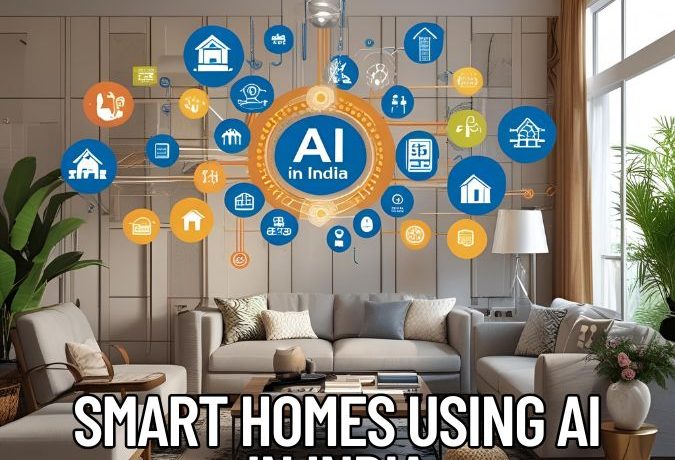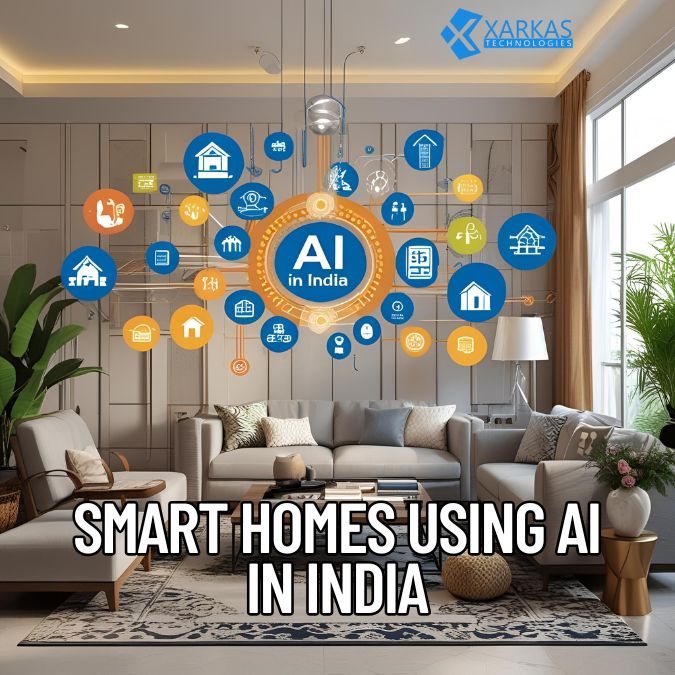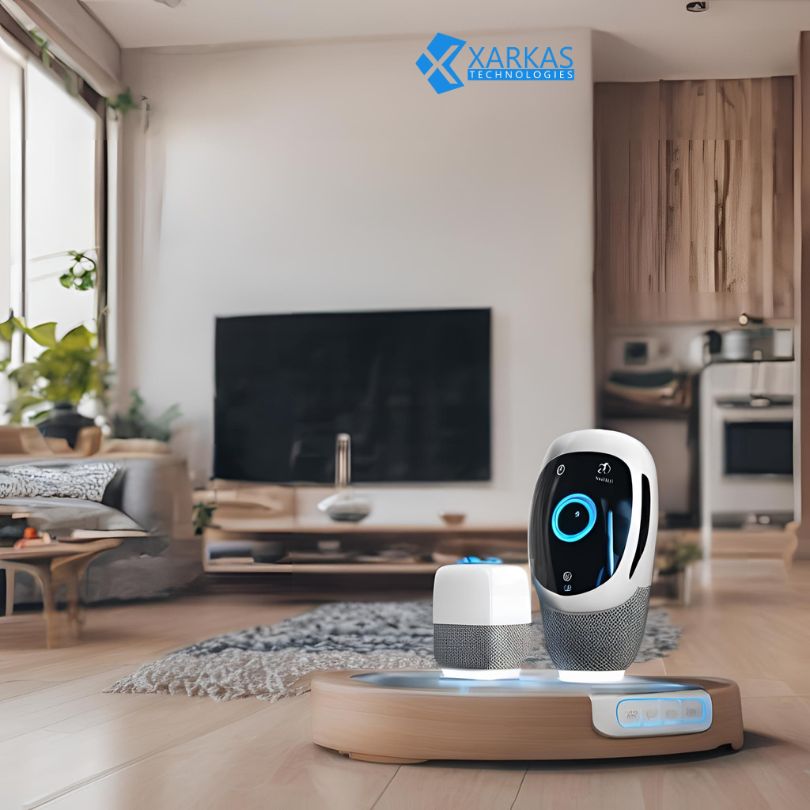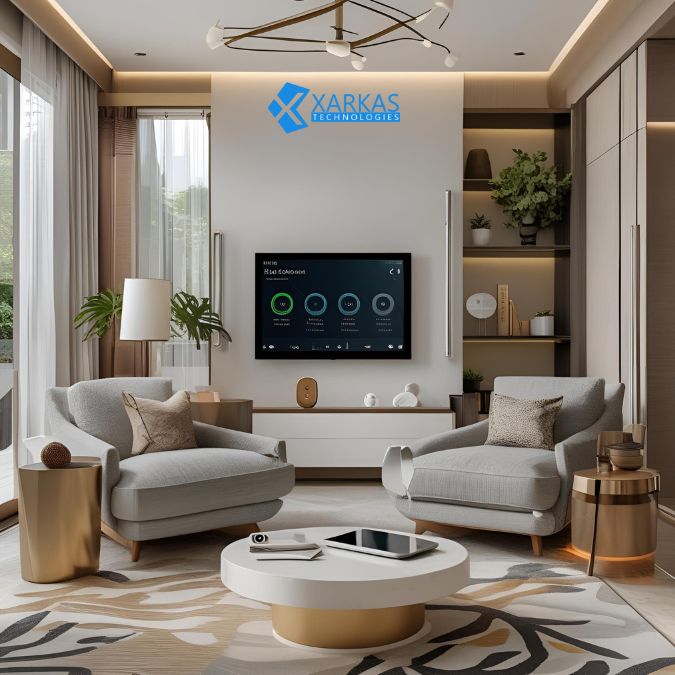
Smart Homes Using AI in India: Opening Up New Possibilities
As the world embraces digital transformation, India is experiencing a revolutionary shift in how we live, work, and manage our homes. Artificial Intelligence (AI) is no longer a futuristic concept—it is actively reshaping the smart home industry in India. The integration of AI into home automation is not just a luxury; it is becoming an essential element of urban living, offering energy efficiency, security, convenience, and sustainability.
Table Of Content
- Understanding AI-Powered Smart Homes in India
- Driving Factors Behind Smart Home Adoption in India
- 1. Rise in Urbanization and Disposable Income
- 2. Government Initiatives Supporting Smart Living
- 3. Growth of IoT and 5G Connectivity
- 4. AI Startups and Tech Giants Fueling Innovation
- Key Features of AI-Powered Smart Homes
- Intelligent Voice Assistants
- Predictive Energy Management
- Advanced Security and Surveillance
- Smart Appliances and Personalized Comfort
- Elder Care and Health Monitoring
- Challenges in AI-Based Smart Home Implementation in India
- High Initial Investment
- Privacy and Data Security Concerns
- Lack of Standardization
- The Future of AI Smart Homes in India
- Integration with Smart City Infrastructure
- Affordability Through Local Innovation
- AI-Powered Sustainability
- Top AI Smart Home Products Available in India
- How to Build an AI-Powered Smart Home in India
- Conclusion: The AI Smart Home Revolution is Here
- Frequently Asked Questions (FAQ)
- 1. What is a smart home?
- 2. How does AI work in smart homes?
- 3. Are AI-powered smart homes popular in India?
- 4. What are the benefits of using AI in smart homes?
- 5. Which are the most popular AI smart home devices in India?
- 6. Is it expensive to set up an AI smart home in India?
- 7. Are smart homes secure?
- 8. Can smart home devices work without the internet?
- 9. What role do Indian startups play in the smart home industry?
- 10. How does AI help in energy conservation at home?
- 11. Can AI smart homes help the elderly in India?
- 12. What is the future of AI smart homes in India?
Understanding AI-Powered Smart Homes in India

Smart homes refer to residences equipped with automated systems that control lighting, temperature, entertainment units, and security systems. When AI is incorporated into these systems, they become intelligent, capable of learning from user behavior and making proactive decisions.
In India, smart homes have seen a surge due to growing internet penetration, affordable smartphones, and increasing awareness of smart technologies. With AI, devices are no longer just controlled remotely—they analyze data and make intelligent choices for the residents’ comfort and security.
Driving Factors Behind Smart Home Adoption in India
1. Rise in Urbanization and Disposable Income
India’s urban population is projected to reach 600 million by 2031, creating a vast market for AI-powered smart solutions. As more individuals enter the middle class, there’s a rising demand for technology that simplifies life.
2. Government Initiatives Supporting Smart Living
Government programs such as the Smart Cities Mission and Digital India have significantly promoted the adoption of AI-based solutions. These programs encourage infrastructure development that supports smart and connected homes.
3. Growth of IoT and 5G Connectivity
The Internet of Things (IoT) and upcoming 5G networks are the backbone of smart homes. They enable seamless communication between devices, allowing real-time automation and remote control.
4. AI Startups and Tech Giants Fueling Innovation
India’s burgeoning startup ecosystem and global tech companies like Google, Amazon, and Tata Elxsi are investing in smart home technologies, making AI-driven systems more accessible and affordable.
Key Features of AI-Powered Smart Homes

Intelligent Voice Assistants
Devices like Amazon Alexa, Google Assistant, and Apple Siri have transformed how Indian households operate. Through natural language processing (NLP), these voice assistants control everything from lights and fans to music and weather updates.
Predictive Energy Management
AI enables systems to analyze electricity usage patterns, predicting consumption and optimizing energy use. This leads to reduced electricity bills and promotes eco-friendly living—a major priority in Indian metropolitan cities.
Advanced Security and Surveillance
AI-backed security systems offer facial recognition, motion detection, and automated alerts. Companies like Godrej, CP Plus, and Hikvision provide solutions that enhance home safety by analyzing behavior and identifying unusual activity.
Smart Appliances and Personalized Comfort
AI-powered devices learn user preferences over time. Smart thermostats, automated curtains, and intelligent lighting systems adjust based on time of day, user routines, and even weather patterns—providing a customized home environment.
Elder Care and Health Monitoring
AI in smart homes also supports remote health monitoring, especially for elderly individuals. Devices like smart beds, wearable monitors, and AI-enabled emergency systems ensure safety and quick response in medical situations.
Challenges in AI-Based Smart Home Implementation in India
High Initial Investment
Though prices are falling, setting up a fully automated AI smart home still requires substantial upfront costs, which may be a barrier for many Indian households.
Privacy and Data Security Concerns
AI devices collect vast amounts of personal data. Without robust data protection laws, there are concerns about how this information is stored and used.
Lack of Standardization
With numerous manufacturers in the market, there’s often a lack of interoperability between devices, making it difficult to create a seamless smart home environment.
The Future of AI Smart Homes in India

The Indian smart home market is expected to grow at a CAGR of over 30% in the next decade. As AI algorithms become more sophisticated and infrastructure matures, homes will become smarter, more responsive, and energy-efficient.
Integration with Smart City Infrastructure
With urban centers becoming smarter, there will be deeper integration between smart homes and city-wide AI networks. Homes will connect to grids that monitor traffic, weather, pollution, and energy needs in real time.
Affordability Through Local Innovation
Indian startups are rapidly innovating in the smart tech sector. Brands like Oakter, Cubical Labs, and Wozart are offering cost-effective smart home products tailored to Indian needs and climatic conditions.
AI-Powered Sustainability
Future smart homes in India will rely heavily on green AI systems that reduce waste, lower carbon footprints, and support sustainable resource usage, which aligns with India’s climate goals under the Paris Agreement.
Top AI Smart Home Products Available in India
| Product | Brand | Key Feature |
|---|---|---|
| Echo Devices | Amazon | Voice-controlled smart hub |
| Mi Smart LED Bulbs | Xiaomi | App-controlled lighting |
| Wipro Smart Plugs | Wipro | Appliance automation |
| Nest Thermostat | Learning-based climate control | |
| Realme Smart Cam | Realme | AI surveillance with night vision |
These products are increasingly available through Amazon, Flipkart, Reliance Digital, and other Indian e-commerce platforms, making AI home automation widely accessible.
How to Build an AI-Powered Smart Home in India
-
Start Small – Begin with a voice assistant and a few smart lights or plugs.
-
Choose Scalable Systems – Opt for ecosystems that allow future expansion.
-
Ensure Compatibility – Use devices that can communicate across platforms (e.g., Alexa + Google Home compatible).
-
Invest in Security – Choose AI systems with strong encryption and update firmware regularly.
-
Use Local Support – Work with Indian brands for service reliability and language localization.
Conclusion: The AI Smart Home Revolution is Here
AI is redefining home living in India, creating an ecosystem that prioritizes comfort, safety, efficiency, and sustainability. As infrastructure improves and technology becomes more accessible, smart homes will no longer be a niche trend but a mainstream lifestyle choice. The synergy between AI, IoT, and smart living is unlocking unprecedented opportunities for Indian homeowners.
Frequently Asked Questions (FAQ)
1. What is a smart home?
A smart home is a residence that uses Internet-connected devices to enable the remote management and automation of appliances and systems such as lighting, heating, security, and entertainment.
2. How does AI work in smart homes?
Artificial Intelligence (AI) allows smart home devices to learn from user behavior, adapt to preferences, and make autonomous decisions to improve convenience, efficiency, and safety. For example, an AI system can turn off lights when no one is in the room or adjust the thermostat based on your past usage.
3. Are AI-powered smart homes popular in India?
Yes, the adoption of AI-based smart homes in India is growing rapidly, especially in urban areas. Factors such as rising incomes, increasing digital awareness, and the availability of affordable smart devices have fueled this trend.
4. What are the benefits of using AI in smart homes?
Some key benefits include:
-
Energy efficiency
-
Increased security and surveillance
-
Personalized comfort
-
Voice control and automation
-
Health monitoring for elderly and vulnerable residents
5. Which are the most popular AI smart home devices in India?
Popular devices include:
-
Amazon Echo (Alexa)
-
Google Nest Thermostat and Speakers
-
Xiaomi Mi Smart Lights
-
Wipro Smart Plugs
-
Realme Smart Cam and other CCTV systems
6. Is it expensive to set up an AI smart home in India?
While initial setup costs can be high, users can start small with budget-friendly devices like smart bulbs or smart plugs. Over time, they can expand the system. Prices have decreased significantly in recent years, making it more accessible.
7. Are smart homes secure?
Smart homes are generally secure, but data privacy and cybersecurity remain concerns. It’s important to:
-
Use reputable brands
-
Enable device encryption
-
Regularly update firmware
-
Use strong Wi-Fi passwords
8. Can smart home devices work without the internet?
Most AI-powered smart home devices require an active internet connection for remote control, cloud-based AI features, and software updates. However, some basic automation may work offline, depending on the device.
9. What role do Indian startups play in the smart home industry?
Indian startups like Oakter, Cubical Labs, and Wozart are designing smart home solutions tailored for Indian conditions. They focus on local languages, climate compatibility, and cost-effectiveness, making smart homes more accessible.
10. How does AI help in energy conservation at home?
AI can analyze usage patterns and optimize the functioning of electrical appliances, reducing unnecessary consumption. Smart thermostats, for instance, can regulate temperature based on weather and occupancy, leading to significant energy savings.
11. Can AI smart homes help the elderly in India?
Yes, smart homes can be a boon for elderly individuals by offering:
-
Voice-controlled devices
-
Health monitoring systems
-
Emergency alert systems
-
Motion sensors for fall detection
12. What is the future of AI smart homes in India?
The future is bright. With advancements in 5G, IoT, and AI, Indian homes will become smarter, greener, and more connected. The focus will shift to full automation, sustainability, and deep integration with smart city infrastructure.







No Comment! Be the first one.